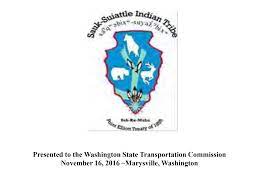|
A northern Washington tribe is suing the state in federal court to avoid paying sales tax on retail purchases sent to its reservation, claiming the tax is discriminatory because Native American consumers must cough up delivery fees that often exceed the tax in order to qualify for an exemption.
In a bare-bones complaint filed Monday in Seattle court, the Sauk-Suiattle Tribe took issue with a provision in Washington law exempting retail items from the state's 6.5% sales tax only if the product was bought in, or delivered to, Indian country. That policy "subjects plaintiff to delivery fees and charges" not imposed on other consumers, the tribe argued, since residents of states with no sales tax — such as Oregon — can make a retail purchase in Washington and get the Evergreen State's tax reimbursed after returning home. Delivery fees for the Sauk-Suiattle are frequently higher than the 6.5% tax, according to a lawyer for the tribe, because its reservation is nestled in the Cascade Mountains, nearly 100 miles from Seattle. With no local retail economy, tribe members often have no option but to purchase goods online. The lawyer, Jack W. Fiander, said he estimates the Sauk-Suiattle Tribe and its citizens have paid at least $300,000 in state sales taxes over the past five years. Washington's tax refund rules for Indigenous communities are especially unjust, Fiander added, because tribes like the Sauk-Suiattle don't even benefit from state programs financed with that revenue. "Taxes are paid to support the government providing services," he said. "And the state provides no services to the Sauk-Suiattle reservation." Washington imposes a 6.5% sales tax on retail products and services, though the rate can be even higher if localities enact their own tax. But the Department of Revenue will refund the state portion for certain items — such as vehicles and farm machinery — or if the consumer lives in a state with no substantial sales tax of its own. Those states include neighboring Oregon, as well as Alaska, Colorado, Delaware, Montana and New Hampshire. Washington state law, under Title 458, includes a similar exemption for purchases by Indigenous residents but only if the product is bought on, or delivered to, tribal land. That requirement, the Sauk-Suiattle said in its lawsuit Monday, violates federal protections for equal rights and property rights. Fiander, the tribe's attorney, called it "kind of offensive" that out-of-state residents can qualify for a tax refund more easily than Native Americans who live in Washington. In addition to eliminating state taxes on their retail purchases, the Sauk-Suiattle want a federal judge to outlaw Washington's rules treating them differently than out-of-state consumers. Another solution, Fiander told Law360, could simply subject Indigenous residents to the normal tax-exemption policy that covers items bought in person. "It shouldn't be that hard for the Washington state legislature to do the same thing for tribal people," he said. Revenue Department spokesman Mikhail Carpenter said Tuesday that state officials were reviewing the suit. "The department does not engage in discrimination while administering the state's tax laws," he told Law360, declining to comment further on the Sauk-Suiattle's claims. The new case differs from past litigation in which Native tribes have sought to block states from imposing a sales tax on transactions within Indian country in the first place. Last year, the Oklahoma Supreme Court dismissed one such case on procedural grounds without answering the central question of taxing authority. Those proceedings were inviable after the Muscogee Nation invoked its sovereign immunity, leaving only a supermarket chain as a plaintiff, the state court ruled. While the Sauk-Suiattle lawsuit is challenging a narrower policy, Chairman Nino Maltos II still cast the dispute on Tuesday as a "sovereignty issue." "The Sauk-Suiattle and other tribes by Treaty gave up millions of acres of land to the United States in return for a homeland in which we were to be governed by our own laws," he said in a statement. "The Sauk-Suiattle Indian Tribe—not the State of Washington—provides all water, sewer, garbage, road maintenance, internet, medical and other government services within our reservation such that there is no justification for imposition of the tax." The Sauk-Suiattle Tribe is represented by Jack W. Fiander of Towtnuk Law Offices Ltd. Counsel information for the state Department of Revenue was not immediately available as of Tuesday evening. The case is Sauk-Suiattle Indian Tribe v. Ryser et al., case number 2:22-cv-01723, in the U.S. District Court for the Western District of Washington.
0 Comments
Leave a Reply. |
HISTORY
April 2024
Categories |
© Walk 4 Change. All rights reserved.


 RSS Feed
RSS Feed